If you’ve been putting off your dentist appointment, it’s time to bump it to the top of your priority list.
We think of going to the dentist to keep our teeth pearly white, our breath fresh, and our mouths free from cavities – but a dentist can also be instrumental in uncovering undiagnosed thyroid issues.
If you already have hypothyroidism, Hashimoto’s disease or other thyroid issues, regular dental exams can help keep things under control. (1) Here’s how.
Are you struggling with a Thyroid condition? We’ve created a FREE guide that shows you how you can heal your thyroid.
Click here to get your FREE copy of our Thyroid Guide!
4 Dental Issues Relating to the Thyroid

The thyroid controls the body’s metabolism and energy levels, affects hormones, regulates hair and skin, and even regulates dental health. (2) Because the thyroid can mess with oral health, it’s important to not only make sure you’re taking care of your thyroid (seeing your doctor, taking your medication, etc.), but to also follow through on regular dentist appointments, since cleanings and other dental care can help to offset thyroid-related problems.
A thyroid disorder can impact every system in the body – including oral health. Here are the top four dental issues that correlate with thyroid problems.
Altered Sense of Taste
Low thyroid hormones can distort your sense of taste and smell in a problem known as dysgeusia. (3)
While this can’t be corrected by a dentist, it is more likely that you might mention this problem while in the dentist’s chair than at an annual checkup.
Make sure to let your dentist know if you’ve noticed that foods tastes “off”, especially if you plan to have any dental work or procedures done. (4)
Bleeding Gums
If you notice blood every time you brush your teeth, take notice. People with thyroid issues typically bleed more easily in the mouth, especially in the gums. Hypothyroidism can increase the amount of bleeding in the mouth, especially when thyroid levels aren’t balanced. (5)
This bleeding might also be a result of gum disease, which can be triggered by inflammation – a factor strongly influenced by thyroid hormones and dysfunction. (6)
Cuts and Infections in Your Mouth (That Won’t Go Away)
Our bodies need the right amount of thyroid hormone to be able to repair and restore themselves. Without enough of the thyroid hormones T3 and T4, it will take longer for wounds to heal, including gums and tissues in the mouth. This can lead to higher chances for infection or complications after routine procedures, like dental work. (7)
Additionally, surgeries routinely use iodine as an antiseptic, and people with hypothyroidism or Hashimoto’s might have a flare when exposed to iodine in any form. (8)
Fluoride and the Thyroid
One issue that isn’t often connected is that sometimes, in the pursuit of a healthy mouth, we use lots of dental products that contain fluoride: toothpaste, mouthwash, and treatments during dental cleanings. Fluoride is also found in public water supply.
Fluoride can cause thyroid issues, especially when it comes to hypothyroidism, and should be minimized or eliminated in anyone dealing with thyroid problems. (9) The negative effects of fluoride are especially found in people with low iodine levels; however, iodine supplementation in people who have autoimmune thyroid problems can also exacerbate antibody production. (10) The best course of action is to eliminate exposure to fluoride, and to obtain iodine from dietary sources, not from supplementation.
5 Ways to Naturally Address Dental Problems
While nothing can replace a trip to the dentist, there are a few things you can do to keep your teeth in tip-top shape. While keeping your mouth healthy won’t avoid thyroid problems, it can minimize thyroid-induced complications in your mouth while also protecting your heart. (11)
Quick reference for a nightly dental routine: You’ll want to oil pull first (how-to below), then floss, brush, and finally, use mouthwash at the end.
1. Brush Your Teeth Regularly

Obvious, we know. But it can be easy to brush too quickly, or not brush enough times in a day. Remember to brush at least twice a day, and while there isn’t a set time recommended, make sure you get each of your teeth – front and back – as well as your tongue. (12)
Be sure to use a natural toothpaste without harmful chemicals or artificial coloring, like Dr. Bronner’s All-One Toothpaste or Earthpaste.
You can also DIY your own toothpaste! See the recipe below.
2. Floss Daily
If you have thyroid issues and your gums bleed easily, you may not be thrilled about flossing. The good news is you don’t have to rely on old-fashioned string floss, which might be painful or off-putting. Instead, grab a water flosser which, when used regularly, can remove those pesky food particles between your teeth and also cut down on irritation along the gum line.
Water flossing might take a bit of extra work, but these days, you can even get portable options that don’t have to be plugged in, like this Waterpik.
Try flossing a few times daily if you’re battling periodontal issues or gingivitis, and at least once before bed if you’re trying to maintain good oral health.
3. Try Oil Pulling

Simply swishing coconut oil around in your mouth helps to moisturize your mouth tissues, which reduces the chance of infection or inflammation. (13) When paired with mouthwash and other good dental hygiene, oil pulling can eliminate the bad bacteria responsible for inflamed gums and other oral problems. (14)
So how do you oil pull? Take a tablespoon of coconut oil and swish in your mouth for two minutes, eventually working your way up to 10 or even 20 minutes. Do not swallow the oil! Be sure to spit in a paper towel or right into the trash, as oil in plumbing is not a good combination.
If you have dental issues, try oil pulling three times per day. Otherwise, do it daily for good oral hygiene.
4. Use Mouthwash
Mouthwash kills bad bacteria and removes particles that can become plaque if they stay stuck to the teeth and gum line. But all mouthwash isn’t created the same, and many modern ones are packed full of fake coloring, artificial sweeteners, and other ingredients that might irritate your mouth!
We recommend the brands Lucky Teeth and Dr. H & Co. Or see below to DIY your own!
5. Brush with Turmeric or Charcoal

If you want to take your oral care routine to expert level, add some extra ingredients to your brushing routine to naturally whiten teeth, kill bad bacteria, and support healthy gums.
Turmeric powder is an excellent way to naturally brighten your teeth and reduce oral inflammation. Yes, you’re brushing with something orange – but when it’s rinsed away, your mouth will be left fresher and with regular use, your teeth will be whiter.
You can get the same whitening and antibacterial results by brushing with charcoal (not the kind you grill with – the kind that comes in a supplement capsule). When used regularly for a few weeks, you’re going to notice a brighter shine, paler gums (which means they’re less inflamed), and an overall fresher feeling in your mouth.
Natural Dental Products You Can DIY
Many conventional dental products contain fluoride and other chemicals that aren’t necessarily healthy. (15) Fluoride is associated with thyroid problems, and even other organic toothpaste versions contain carrageenan and other products that are associated with inflammation. If you want to have a healthy mouth, you don’t have to purchase pre-made products that might be filled with preservatives and chemicals that could be working against you.
Instead, you can DIY most of your own dental products and keep costs down while protecting your shiny, white smile. Here’s how to make your own toothpaste.
DIY Coconut Oil Toothpaste
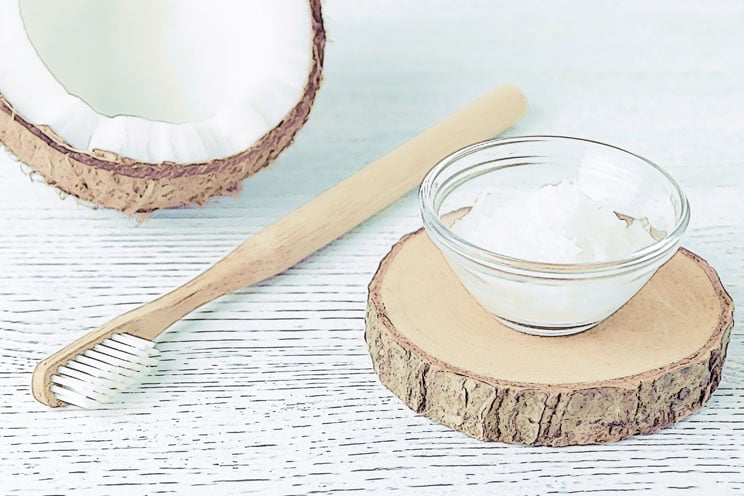

DIY Coconut Oil Toothpaste
Tools
- Glass jar
Ingredients
- 2 T coconut oil, melted
- 1 T baking soda
- 5 drops clove essential oil
- 10 drops peppermint essential oil
- 5 drops spearmint essential oil
- Water, a few drops as needed, for consistency adjustments
Instructions
- Stir together all ingredients in a glass jar. Keep at room temperature.
- Use a pea-sized dollop of toothpaste to brush your teeth.
DIY Minty Fresh Mouthwash
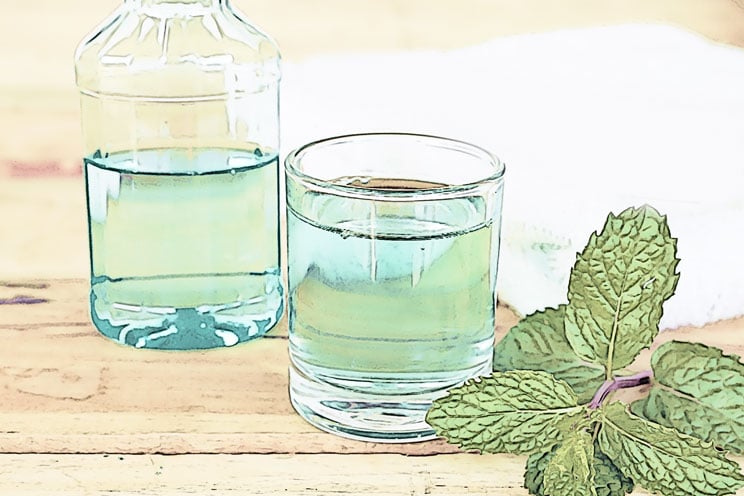

DIY Minty Fresh Mouthwash
Tools
- Glass jar
Ingredients
- 1 cup distilled water
- 2 T food-grade hydrogen peroxide
- 10 drops peppermint essential oil
- 5 drops spearmint essential oil
- 10 drops clove essential oil
- 5 drops oregano essential oil
- 5 drops cinnamon essential oil
- 5 drops tea tree essential oil
Instructions
- Mix all ingredients together in a glass jar.
- To use, swish 1 T in your mouth after brushing your teeth.
DIY Whitening Powder
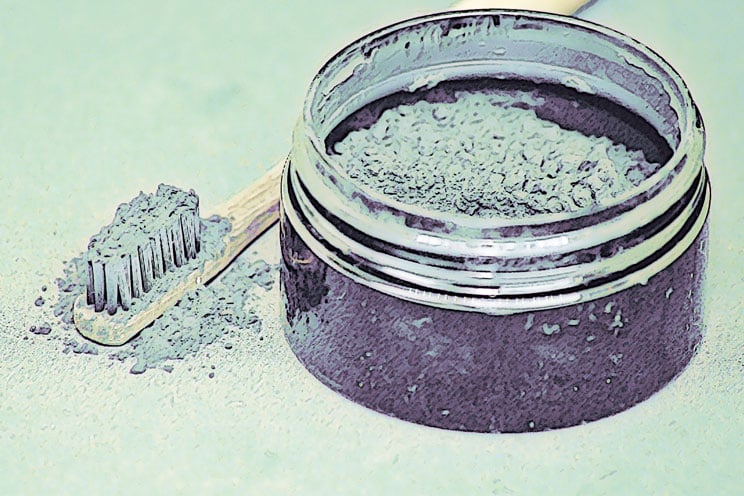

DIY Whitening Powder
Tools
- Glass jar
Ingredients
- ½ cup coconut oil, melted
- 2 T turmeric or 2 capsules charcoal, broken
Instructions
- In a glass jar, stir the coconut oil with turmeric or charcoal. Store lidded at room temperature.
- To use, dip a toothbrush (you’ll want to have one just for this purpose!) into the mix and brush gently for 1-2 minutes. Rinse with water, and then continue with your mouth care routine: oil pulling, whitening powder, flossing, brushing, and finally, mouthwash. For best results, do 1-2 times daily.
Bottom Line
Thyroid problems are closely related to some small but potentially problematic dental issues. That’s why it’s so important to make sure your thyroid doctor knows what your dentist is doing, and vice versa. Be sure to brush and floss every single day, and consider making your own toothpaste, mouthwash and whitening powder for all-natural tooth care.
(Read This Next: 14 Common Causes of Bad Breath and How to Freshen Up)






 Cinnamon Spice Pear Bread
Cinnamon Spice Pear Bread
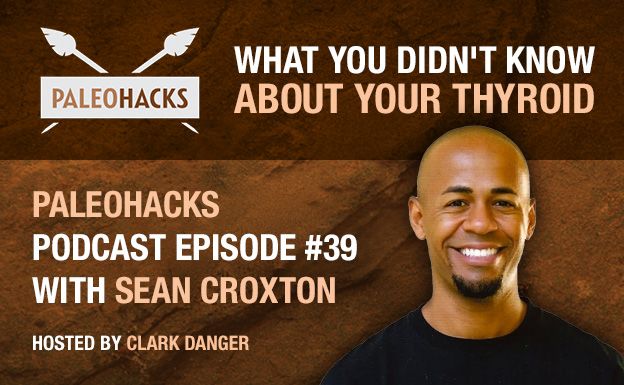
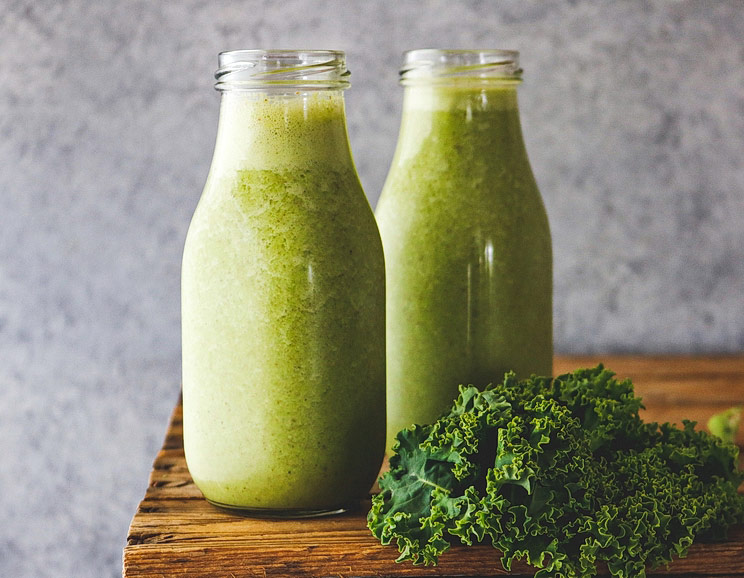







Show Comments